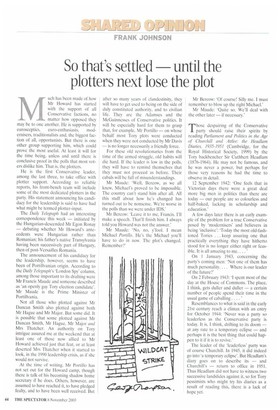So that's settled until the plotters next lose the plot
Much has been made of how Mr Howard has started with the support of all Conservative factions, no matter how opposed they may be to one another. He is supported by eurosceptics, euro-enthusiasts, modernisers, traditionalists and, the biggest faction of all, opportunists. But there is one other group supporting him, which could prove the most useful. At least it will for the time being, unless and until there is conclusive proof in the polls that most voters dislike him. That is, the plotters.
He is the first Conservative leader, among the last three, to take office with plotter support. According to reliable reports, his front-bench team will include some of the most dedicated plotters in the party. His statement announcing his candidacy for the leadership is said to have had what might be termed plotter-input.
The Daily Telegraph had an interesting correspondence this week — initiated by the Hungarian-descended Mr Egon Ronay — debating whether Mr Howard's antecedents were Hungarian rather than Romanian; his father's native Transylvania having been successively part of Hungary, then of post-Versailles Romania.
The announcement of his candidacy for the leadership, however, seems to have been of Portillvanian origin. According to the Daily Telegraph's 'London Spy' column, among those important to its drafting were Mr Francis Maude and someone described as 'an openly gay Tory election candidate'. Mr Maude is the Prime Minister of Portillvania.
Not all those who plotted against Mr Duncan Smith also plotted against both Mr Hague and Mr Major. But some did. It is possible that some plotted against Mr Duncan Smith, Mr Hague, Mr Major and Mrs Thatcher. An authority on Tory intrigue assured me at the weekend that at least one of those now allied to Mr Howard achieved just that feat, or at least deserted Mrs Thatcher when it started to look, in the 1990 leadership crisis, as if she would not survive.
At the time of writing, Mr Portillo has not set out for the Howard camp, though there is talk of his becoming shadow home secretary if he does. Others, however, are assumed to have reached it, to have pledged fealty, and to have been well received. But after so many years of clandestinity, they will have to get used to being on the side of duly constituted authority, and to civilian life. They are the Adamses and the McGuinnesses of Conservative politics. It will be especially hard for them to grasp that, for example, Mr Portillo — on whose behalf most Tory plots were conducted when they were not conducted by Mr Davis — is no longer necessarily a friendly force.
For these old revolutionaries from the time of the armed struggle, old habits will die hard. If the leader is low in the polls, they will have to remind themselves that they must not proceed as before. Their cabals will be full of misunderstandings.
Mr Maude: 'Well, Bercow, as we all knew, Michael's proved to be impossible. The country can't stand him after all. All this stuff about how he's changed has turned out to be nonsense. We're worse in the polls than we were under IDS.'
Mr Bercow: 'Leave it to me, Francis. I'll make a speech. That'll finish him. I always told you Howard was not the answer.'
Mr Maude: 'No, no, y'fool. I mean Michael Portillo. He's the Michael you'll have to do in now. The plot's changed. Remember?'
Mr Bercow: 'Of course! Silly me. I must remember to blow up the right Michael.'
Mr Maude: 'Quite so. We'll deal with the other later — if necessary.'
Those despairing of the Conservative party should raise their spirits by reading Parliament and Politics in the Age of Churchill and Attlee: the Headlam Diaries, 1935-1951 (Cambridge, for the Royal Historical Society, 1999) by the Tory backbencher Sir Cuthbert Headlam (1876-1964). He may not be famous, and he was never a power, but perhaps for those very reasons he had the time to observe in detail.
12 September 1942: 'One feels that in Victorian days there were a great deal more big men in politics than there are today — our people are so colourless and half-baked, lacking in scholarship and education.'
A few days later there is an early example of the problem for a true Conservative posed by 'modernisers' and believers in being 'inclusive': 'Today the most old-fashioned Tories . . . keep assuring one that practically everything they have hitherto stood for is no longer either right or feasible. It is all amazing to me. .
On 1 January 1943, concerning the party's coming men: `Not one of them has much personality.. . . Where is our leader of the future?'
On 2 February 1943: 'I spent most of the Jay at the House of Commons. The place, I think, gets duller and duller — a certain number of people spend their time in the usual game of caballing. . . '
Resemblances to what is said in the early 21st century reach a climax with an entry for October 1944: 'Never was a party so leaderless as the Conservative party is today. It is, I think, drifting to its doom — at any rate to a temporary eclipse — and perhaps it is the best thing that could happen to it if it is to revive.'
The leader of the `leaderless' party was of course Churchill. In 1945, it did indeed go into 'a temporary eclipse'. But Headlam's diary goes on to describe its — and Churchill's — return to office in 1951. Thus Headlam did not have to witness two successive landslides against it, so for Tory pessimists who might try his diaries as a result of reading this, there is a lack of hope yet.


































































































 Previous page
Previous page